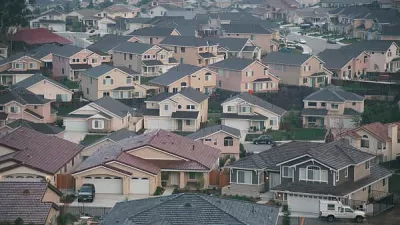In this opinion piece from The Huffington Post, Alex Becker argues that retrofitting suburban landscapes with denser development trumps all other sustainability agendas as the single most important path to a more sustainable future.
Becker highlights suburban areas as a prime starting point in the movement towards more sustainable, resilient cities in the United States. He states that the answer to how we should best utilize our existing suburban infrastructure is "simple," and that planners and policymakers should aim first and foremost to "Move things closer together!"
Becker continues:
"Calls to be greener and use less energy are all well and good, but ultimately mean nothing unless we can fundamentally restructure the suburban environment in which a large swath of the American public lives. In suburbia, overconsumption may seem like a choice (and perhaps at a certain extreme level it is), but the physical reality remains that large-scale resource consumption is the only way to survive in the environment which we've built for ourselves. 50% of Americans live in suburban spaces only inhabitable with a large dollop of natural resources."
FULL STORY: Life After Sprawl: Why the Green Revolution Must Start in Suburbia

Planetizen Federal Action Tracker
A weekly monitor of how Trump’s orders and actions are impacting planners and planning in America.

Chicago’s Ghost Rails
Just beneath the surface of the modern city lie the remnants of its expansive early 20th-century streetcar system.

San Antonio and Austin are Fusing Into one Massive Megaregion
The region spanning the two central Texas cities is growing fast, posing challenges for local infrastructure and water supplies.

Since Zion's Shuttles Went Electric “The Smog is Gone”
Visitors to Zion National Park can enjoy the canyon via the nation’s first fully electric park shuttle system.

Trump Distributing DOT Safety Funds at 1/10 Rate of Biden
Funds for Safe Streets and other transportation safety and equity programs are being held up by administrative reviews and conflicts with the Trump administration’s priorities.

German Cities Subsidize Taxis for Women Amid Wave of Violence
Free or low-cost taxi rides can help women navigate cities more safely, but critics say the programs don't address the root causes of violence against women.
Urban Design for Planners 1: Software Tools
This six-course series explores essential urban design concepts using open source software and equips planners with the tools they need to participate fully in the urban design process.
Planning for Universal Design
Learn the tools for implementing Universal Design in planning regulations.
planning NEXT
Appalachian Highlands Housing Partners
Mpact (founded as Rail~Volution)
City of Camden Redevelopment Agency
City of Astoria
City of Portland
City of Laramie




























